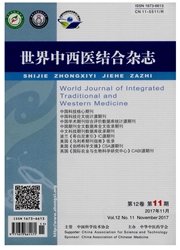

 中文摘要:
中文摘要:
绝经妇女由于气、血开始衰退,身体机能下降,适应能力减低,精神压力增大等生理和社会环境原因而容易导致肝郁。肝郁后一方面通过影响肝的疏泄、藏血、主筋功能使骨失去气血的濡养;另一方面肝郁通过影响肾和脾胃,使精血互化机制失调,肾不藏精,脾胃升清降浊功能失司,气血生化无源,进而造成骨痿。这是肝郁在绝经后骨代谢异常中的发病机制所在。肾虚是绝经后妇女身体的普遍状态,是绝经后骨代谢异常的发病基础,而肝郁是该病发生的关键。
 英文摘要:
英文摘要:
When women are in the menopausal stage,qi and blood and body function are getting de-cline,the adaptability is reduced and mental stress increased. Those physiological and social factors easily in-duce liver stagnation. Liver stagnation,on the one hand,affects the qi flowing,blood storage and tendon strengthening,which results in malnutrition of qi and blood in the bone;on the other hand,affects the kidney, spleen and stomach,resulting in the dysfunction of mutual transformation of essence and blood,failure of kid-ney to store essence,dysfunction of the spleen and stomach in ascending the clear and descending the turbid, no source for qi and blood manufacture. The mentioned above is the mechanism on the pathogenesis of postm-enopausal metabolic bone disorder. Kidney deficiency is the general state of women after menopause and is the basis for the occurrence of metabolic bone disorder,in which,liver stagnation is the key of the disorder oc-currence.
 同期刊论文项目
同期刊论文项目
 同项目期刊论文
同项目期刊论文
 Tongue coating microbiome regulates the changes in tongue texture and coating in patients with post-
Tongue coating microbiome regulates the changes in tongue texture and coating in patients with post- 期刊信息
期刊信息
